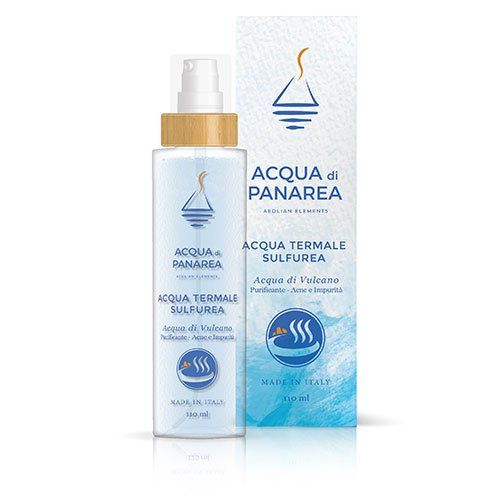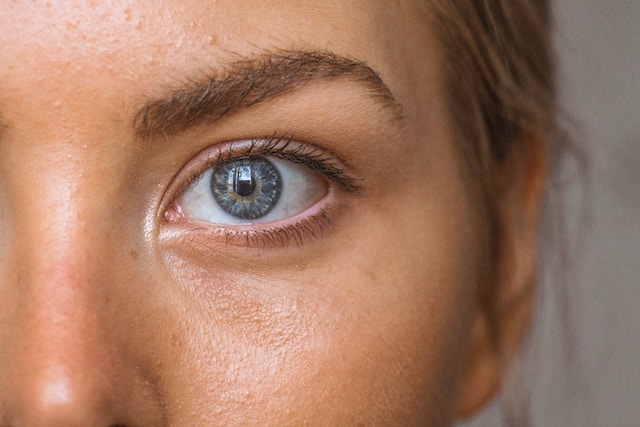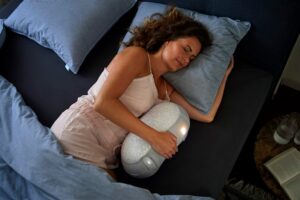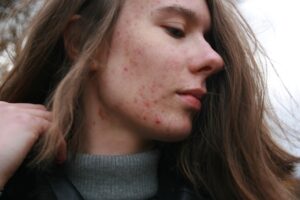L'acne on the face can, unfortunately, put a strain on self-esteem. Although it is a common issue, one cannot always accept having a acne prone skin.
Acne is a common skin condition that affects millions of women as well as men worldwide, regardless of age.
We are here to accompany you on a journey to understand the causes of acne, the different types and also the natural remedies that can help reconcile you with your reflected image in the mirror. A gentle and sustainable approach to skin care is, after all, the best choice.
Get ready to put aside your insecurities by embracing knowledge of the subject: acne will no longer be a secret.
What is acne on the face
We know that if you've seen at least one pimple on your face or of theacne on forehead, you may have already asked yourself the question. At first glance, we could say that acne is just that unexpected guest that appears when you least expect it and, most importantly, at the least opportune times.
But there is much more behind this term. L'acne on the face is a dermatological condition which occurs when the pilifer follicles get clogged with sebum e dead cells Of the skin.
Sebum is a natural oil that is produced by the sebaceous glands for moisturize and protect the skin facial. When everything is working well, this system is the perfect ally for a bright and moisturized skin.
But sometimes, as in the script of a dramatic film, the balance is broken. If the sebaceous glands become overactive, due to hormones, stress or genetic factors, may produce excessive sebum.
If in turn this goes to mix with the dead cells of the face you have the 'obstruction of hair follicles. So-called blackheads and ,if the walls of the follicle rupture those pesky Red or pus-filled pimples.
Acne, then, can be made worse by specific bacteria that may lurk on the skin of the face. In this case, a real inflammation That makes it even more obvious.
Other information to know is that there are various types of acne and each of these must be treated with specific treatments and natural remedies. Otherwise, trying to eradicate the problem will be a real mission impossible.
The causes of acne
When it comes to the causes of acne you must always remember that this is a complex problem and, as such, is caused by several factors that are very heterogeneous.
Among the first causes include, without a doubt, the hormones which are especially typical of the adolescent stage but not only. During puberty, pregnancy or the menstrual cycle, our bodies experience some hormonal changes that can go to stimulate the sebaceous glands To produce more sebum than normal.
This explains, for example, why acne is so common among adolescents and can appear or worsen during certain periods of the menstrual cycle or during the pregnancy phase.
Also the excessive sebum production results in the emergence of acne. It is not just hormonal changes, but there are several situations in which this occurs. One oily skin and strongly sebaceous will be more likely to develop the problem.
This occurs, specifically, at the time when the sebaceous glands skin produce too much sebum leading to thepore clogging And to the formation of acne.
Sometimes it is also the natural process of skin renewal to be disturbed, thus leading to a accumulation of dead cells that go to clog pores by mixing with sebum.
We also point out that the bacteria living on the skin, like the Propionibacterium acnes, can infect clogged pores, causing inflammation and worsening acne.
Some studies have suggested a Link between acne and a high glycemic index diet, which includes sweets, sugary drinks and foods high in carbohydrates. Again, facial skin is affected and the dreaded pimples appear.
Also note that underlying acne may be some genetic factors. Ask your parents if they had any of these problems and you might find the cause of your pimples.
Finally, we need to talk about thecosmetic acne, which is created due to the misuse of products for the skin care too aggressive or wrong cosmetic products.
Please note that acne spots can be unsightly. In this regard, read our guide on best anti-stain cream for face
The types of facial acne
Acne can occur in many different shapes, each with their own unique features. Understanding what kind of facial acne you suffer from will also help you understand the most appropriate treatment.
We start with the most common type of acne: l'comedonic acne. This typology is characterized by the presence of the so-called blackheads.
These are. blackheads o white dots that often peep out on our facial skin and mainly affect the nose area, the chin area and the cheek area.
These small, dark-colored dots form When a pore fills with sebum and dead skin cells., which oxidize on contact with air.
In contrast, white dots, or comedones closedi, are formed when the pore is completely obstructed and the contents remain below the surface of the skin.
Comedo acne can be a persistent problem, but it tends to be less inflammatory and less severe than other types. This does not mean, however, that it should not be treated properly, as it can progress and become a more severe type of acne.
We move on, then, to discover thepapulo-pustular acne. It is a very common form of acne, however, which is a step up from comedonic acne. In addition to comedones, it presents papules and pustules and this explains the name that was chosen.
Le papules are small reliefs on the skin, usually red in color, that can be sensitive to touch. They are the result of aInflammation or infection within the pores.
Le pustules, on the other hand, differ from papules because they have a white center or yellowish signaling thepus accumulation. They are often confused with pimples, but they are actually a more severe form of acne.
When pain is experienced, however, it is referred to as. Nodule-cystic acne. This is the most painful type, as it is characterized by nodules and cysts.
This is the most severe type of acne and can be quite painful. It is characterized by nodules and cysts.
Nodules are inflammatory lesions that form deeply under the skin, giving the skin a irregular appearance and often painful to the touch.
Cysts form when inflammation extends even deeper, filling with pus. Unlike pustules, cysts are larger and develop deeper under the skin.
Unfortunately, if not treated properly, lumpy-cystic acne can lead to Permanent scars. If you have this type of problem, we recommend that you consult a dermatologist to outline the most appropriate treatment.
Also theacne conglobate Is a distinctly severe but rare form. This type is found mainly in the men and is characterized by many large inflammatory lesions, nodules, cysts e traces of blackheads. This type of acne can cause significant damage to the skin and requires specialized medical treatment.
L'acne fulminans is a sudden form that is often accompanied by systemic symptoms such as fever e joint pain. We want to reassure you that this type of acne is very rare and requires urgent medical intervention.
Remedies: what to do to fight acne
After analyzing acne and its complex nature, it is time to talk about the remedies. What to do to fight acne? We are sure you are asking yourself this very question after reading everything.
Therefore, we want to reveal to you the remedies and strategies that can be adopted to combat it. We will look together at both the topical treatments that the rnatural imediates.
Also, the first thing you should keep in mind is that you especially need a lifestyle change Because this is one of those details that can make all the difference.
When it comes to acne and other skin issues, it is good to know that the skincare is essential. As we have already told you, using the best products for one's skin helps not only to solve the problem but also to have a glowing, radiant face.
To choose the anti-acne products it is necessary to evaluate the ingredients well. I skin care products which contain active ingredients such as thesalicylic acid, l'azelaic acid o i retinoids can be useful in the treatment of acne.
These ingredients, in fact, act reducing inflammation and Eliminating acne-causing bacteria. They can also promote the cell renewal so as to prevent clogging of pores.
There are also many natural remedies for acne. These include, for example, the tea tree oil which is known for its antibacterial properties, perfect for this occasion. Likewise, the green clay mask Is perfect for reducing excess sebum.
However, these remedies should be used as a complement and not as a substitute for a regimen of skin care well-structured.
For example, it is essential to use purifying skincare products as Vulcan Water, the purifying sulfur water of Panarea Water.

This is a product indicated for the acne-prone skin. The special mix of ingredients in this water promotes the skin regeneration And fights bacterial load. All this gives facial skin an instantly more moisturized and clean appearance.
Within the product you will also be able to find aloe vera, with soothing effect, hyaluronan, with moisturizing and anti-aging characteristics, and provitamin B5, soothing and anti-inflammatory.
We remind you that in cases of moderate or severe acne a dermatologist is needed, who may prescribe oral medications or hormonal medications. These medications can be very effective but you need to talk to your specialist of choice.
Acne prevention: tips
La skin care is a key element in the treatment and acne prevention. Having a skincare routine adequate can make a big difference in the appearance of your skin.
The first step is, without a doubt, that of the facial cleansing. Wash the face twice a day, both in the morning and in the evening, with a mild detergent can help to remove excess sebum, sweat and impurities that can clog pores.
Remember to avoid rubbing too hard the skin so as not to irritate it and make acne worse. Also thehydration is very important because it can help to remove dead cells Of the skin that can clog pores.
Be careful, however, not to overdo it, as excessive exfoliation can irritate the skin and worsen acne. Once or twice a week is more than enough.
Although it may sound strange, if your skin is oily or acne prone, it is important to moisturize it. Many acne treatments can dry out the skin (read the guide on the best face moisturizer for dry skin). Of course, look for non-comedogenic products That do not clog pores.
Some acne treatments can make the skin more sensitive to the sun. The sun can also darken the spots and scars left by acne, making them more noticeable.
This means that it is important to protect the skin from UV rays With a good non-comedogenic sunscreen product. In our guide on the best facial sunscreen 50+ we give you a lot of advice.
Also pay attention to make-up. Always make sure cthat it is non-comedogenic and oil-free. Always remove makeup before going to bed by properly removing your makeup.
Acne and nutrition
Lately, the relationship between acne and nutrition is becoming increasingly in-depth. Various research suggests that what we eat can actually affect the health of our skin, including the incidence and severity of acne.
After all, you may have often heard that the health of our bodies begins at the table, and this is especially true for the facial skin.
The scientific data available to us suggest that certain types of foods can help increase the levels of insulin in the body, and consequently the sebum production.
These foods include the foods with a high glycemic index. These are foods that cause a rapid rise in blood sugar levels, as refined sugars, white flour, potatoes and some varieties of rice.
Even the dairy products Are acne-prone foods. Hormones in dairy products are thought to influence insulin levels and sebum production.
However, you should not think that there is a real anti-acne diet. Follow, however, these nutritional tips of ours that can help you manage it.
Choose foods with a low glycemic index as fruits, vegetables, legumes, whole grains. This advice is very useful for acne prevention.
In addition, a Diet rich in fruits, vegetables, lean protein, whole grains e fatty acids Can help maintain healthy skin. Drink plenty of water, as this helps to keep the skin hydrated and can help prevent acne.
These are small, simple tips that should always be followed and will give you perfect skin. Remember, a healthy diet is only part of the solution to managing acne.
It is important to follow a good skin care routine, work out REGULAR, get enough sleep and consult a dermatologist or nutritionist for personalized guidance. La skin health Is a reflection of that of the body.
Acne and sun
At this point it is also good to explore the relationship between acne and sun. There is a widespread belief that sun exposure can help cure acne.
This is because sunlight can have a antibacterial effect and why the sun can dry out the pustules.A tanned complexion can temporarily hide the redness associated with acne.
Be careful, however, not to think that the sun is a effective treatment for acne Which, in the long run, could worsen precisely because of sun exposure.
The sun can dry out the skin, which can lead to a temporary reduction in acne. Dry skin, however, can stimulate the sebaceous glands to produce even more sebum to compensate, leading to an increase in acne over time.
Also, always remember that prolonged exposure to the sun can damage the skin, causing redness and burning.
It doesn't end there. Sun exposure can lead to post-inflammatory hyperpigmentation, a condition in which skin becomes darker in areas that have been inflamed or damaged. The sun can make acne spots and scars more noticeable.
So if you suffer from acne, it is important to protect your skin from sun damage. Use sunscreen non-comedogenic (which does not clog pores). Apply it every day, even if it is cloudy, as UV rays can penetrate through clouds.
Avoid the most intense sunshine and try to stay in the shade or wear a wide-brimmed hat when the sun is strongest, usually between 10 am and 2 pm. Reapply sunscreen every two hours.
Frequently asked questions about acne
Acne is caused by an interaction of factors. Sebaceous glands produce sebum that can mix with dead skin cells and clog pores. This environment becomes ideal for the bacterium Propionibacterium acnes, which causes inflammation and pimples. In addition to these biological factors, acne can be influenced by hormones, diet, stress and certain medications. Finally, genetic predisposition may play a role, making some people more prone to acne than others.
Acne treatment may require a combined and individualized approach. Topical treatments include retinoids and salicylic acid, which exfoliate the skin and reduce inflammation. Purifying products such as Vulcan Water from Panarea Water are also essential. Hormones, such as the birth control pill, can help regulate hormonal acne. Lifestyle modifications, such as a balanced diet, exercise, good facial hygiene, and stress control, can also help manage acne.
To remove acne from the face, it is important to follow a consistent skin care routine that includes gently cleansing the face twice a day, using non-comedogenic products, and applying acne-specific treatments. Avoid touching or squeezing pimples to prevent scarring. Adopting a healthy diet and maintaining good hydration levels can help. Also, protect your skin from sun damage.




